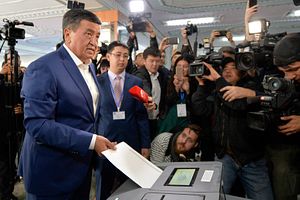Sooronbai Jeenbekov, of the Social Democratic Party (SDPK), looks to have triumphed in momentous Kyrgyzstan presidential election. Preliminary counts show him capturing just over 54 percent with main challenger, Omurbek Babanov, coming in with 34 percent.
Eleven people in total contested the election, but Jeenbekov and Babanov were long considered the frontrunners. Jeenbekov certainly benefited from his affiliation with current Kyrgyz President Almazbek Atambayev, who made little secret of his preference in the race.
Babanov, speaking at a press conference the day after the election, highlighted the problems he and his supporters faced: “State television channels were used to pour dirt on us. There was a black PR [campaign] against us. Our campaign activists were abused; they did not know whom to turn to as law enforcement was also one-side.”
But, he went on, “The election has taken place, and the people have made their choice.” A comment certainly aimed at assuaging mounting fears that the heated election would spark unrest.
Babanov responded to rumors that he would try and seize power, saying, “This is not true. We will not seize power. Our victory is to come. These elections made me and my team stronger.”
The highest drama in the month-long campaign stemmed from Atambayev’s accusation that Babanov’s September 19 meeting in Almaty with Kazakh President Nursultan Nazarbayev was part of an attempt by Astana to influence the election. It didn’t matter that Jeenbekov met with Nazarbayev on August 14, only a week before resigning from the prime minister post to campaign.
Atambayev’s rhetoric against Babanov and Kazakhstan intensified as election day approached. On October 13 when during a visit to the southern Batken region, the Kyrgyz president said:
Now, a foreign country’s moneybags and power holders are imposing their flunky on us…Failing to buy us with their money, they are trying to frighten us…The Kyrgyz people, with at least a 3,000-year history, will never be frightened of a three-day blockade and will never vote for someone’s flunky…
With Jeenbekov’s victory, it’s yet to be seen if Atambayev’s smear campaign will serve only to make his successor’s life more difficult. Kazakhstan is the Central Asian region’s largest economy ,and Kyrgyzstan’s access to the rest of the Eurasian Economic Union (EEU) runs primarily through Kazakh territory.
Jeenbekov campaigned, as Eurasianet describes, on the “promise of stability and continuity — both highly appealing concepts in a country that has known many passages of political turbulence.”
Souring the Kazakh-Kyrgyz relationship as an election strategy may have paid off in the short run by turning voters away from Babanov, but could be a liability in the long run.
Jeenbekov is to be inaugurated on December 1. Any new Kyrgyz president would face a raft of challenges, most importantly the country’s economy. But Jeenbekov now faces a new challenge that is mostly of Atambayev’s making: rehabilitating the relationship with Kazakhstan.
While international observers say in general the election was free and fair, there have been accusations of fraud, misuse of so-called administrative resources, and overstepping of rules that prohibit public figures (like Atambayev) from participating in the campaign.
The Organization for Security and Cooperation in Europe (OSCE) election monitors noted some of the irregularities and oversteps in their preliminary report. “The election campaign was peaceful; however, it also became more confrontational closer to election day, and the IEOM [International Election Observation Mission] received credible reports of misuse of public resources and pressure on voters, as well as allegations of vote-buying.”
In the end, Kyrgyzstan held a largely peaceful though far from perfect election. The citizens chose a president to take over when Atambayev steps down, as the Kyrgyz constitution mandates. An election is just one facet of a democracy — one we tend to overemphasize. The real test is governing, and Jeenbekov is in for quite the challenge.

































